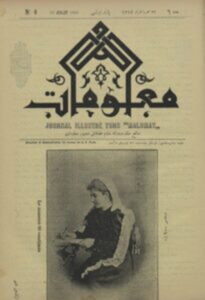Seda İzmirli Karamanlı (SOAS, University of London, Near and Middle East Department)
Teodosya Sophroniades: An Ottoman-Greek / Circassian Female Intellectual Espousing Women’s Rights In Late Ottoman Istanbul
The research project focusses on Teodosya Sophroniades, a prolific female writer, journalist, and Imperial Harem interpreter of Ottoman-Greek and Circassian lineage who, until now, has been practically invisible in academic spheres, warranting investigation and examination. Teodosya was regarded as one of the noteworthy female writers of the Hamidian era and the first woman in the Levant to dedicate herself to the field of journalism. Her contributions to the literary landscape of Istanbul and Paris earned her the Ottoman Order of Charity (second rank), which was bestowed upon her by Sultan Abdülhamid II. She holds the distinction of being the first woman to obtain a license for publishing a periodical in the Ottoman Empire, namely Ma‘rifet (1898) that she directed and edited, and thus demonstrating her pioneering spirit in the field.
An examination of the contextual aspects of Ma‘rifet discloses a notable division, as one part of the periodical was published in Ottoman Turkish and another in French, with each catering to different audiences and topics. The French part, intended for a Western audience, was used by Teodosya Sophroniades exclusively to express her unwavering loyalty and reverence towards the caliph and sultan in an elaborately stylized manner. This non-Muslim woman’s strategic self-portrayal and conscious appeal to Western readers reveals intriguing dynamics in state practices of representation and image production as a response to international publications, which aimed at the dissolution of the Ottoman Empire, while particularly targeting Abdülhamid II.
Teodosya Sophroniades’s short fiction works (1894-1898) centre around women’s issues and the societal challenges related to gender-based divisions. Her female protagonists, hailing from China to Europe, are portrayed as entitled to reject gender-based divisions, challenge the traditional emphasis placed on virginity, engage in extramarital affairs, and disregard their maternal roles. Teodosya Sophroniades employs carefully crafted writing strategies that effectively highlight the internal conflicts experienced by her female characters due to their legitimised extramarital passions. The study endeavours to provide a comprehensive analysis of her positioning within the literary and feminist arenas of the late 19th-century by foregrounding her Ottoman-Turkish and French writings in Ma‘rifet and in the Stamboul newspaper, and thus allowing for several conclusions to understand the impact of a non-Muslim female writer within the Ottoman women’s movement, whose studies often privilege the experiences of Turkish Muslim women.

